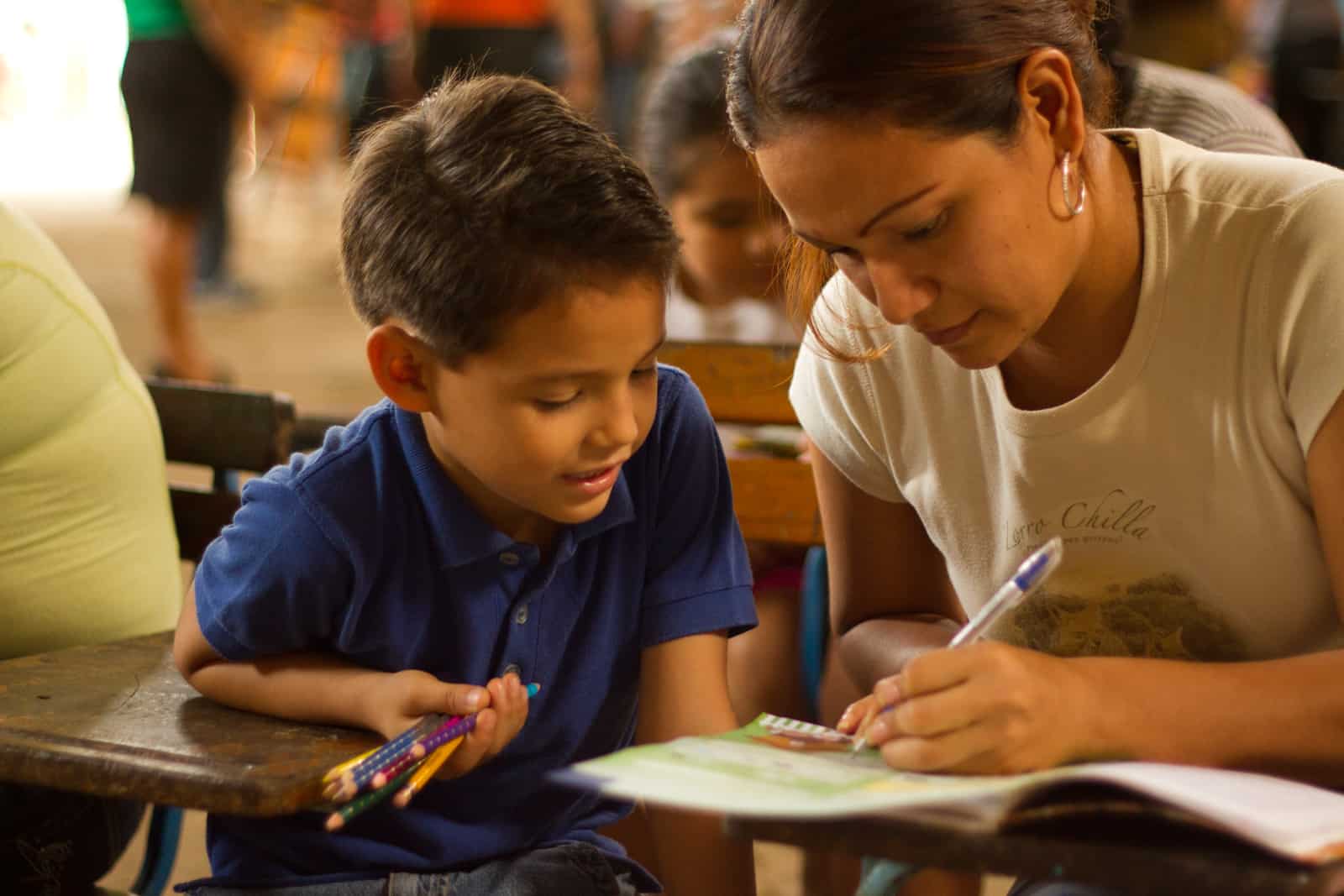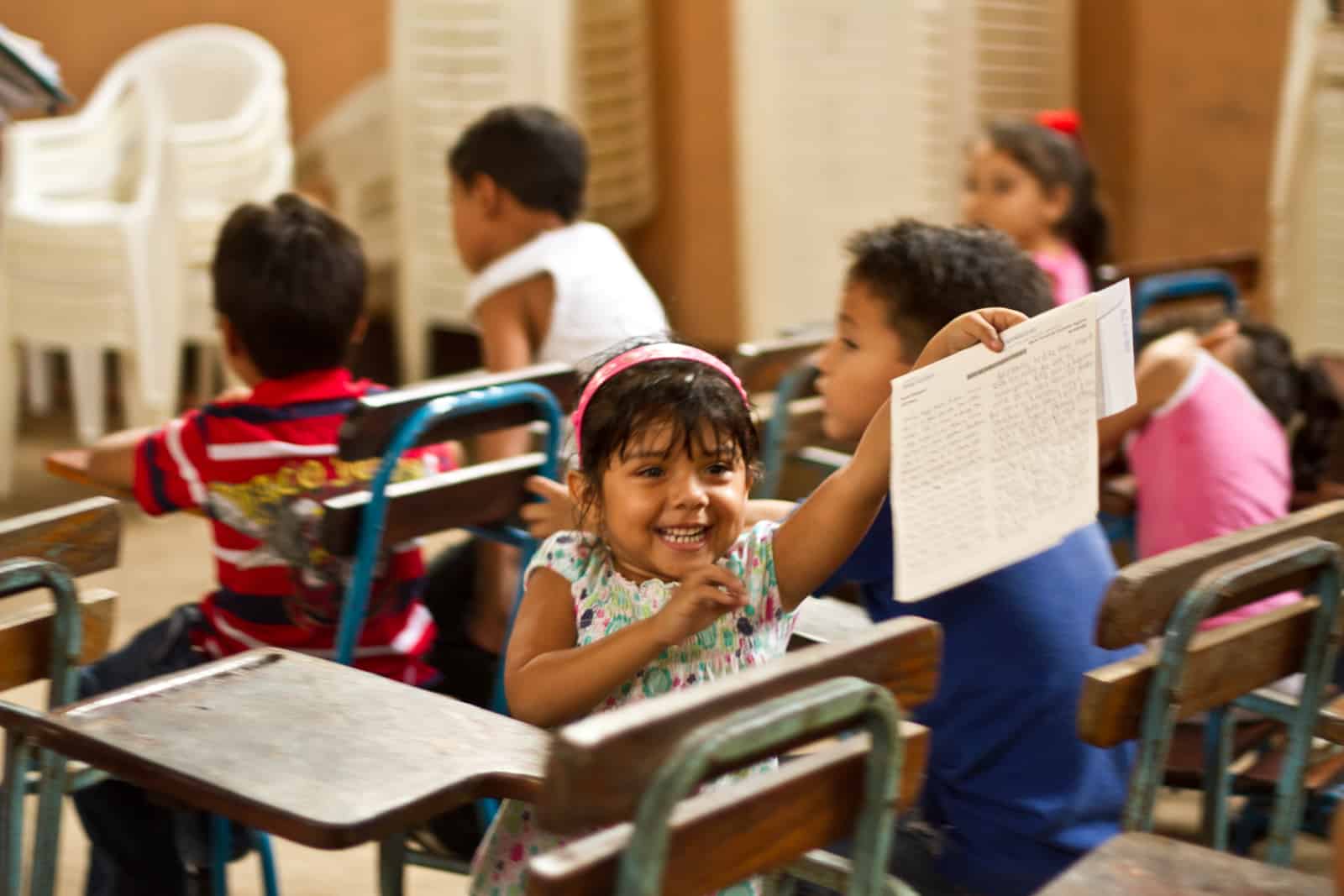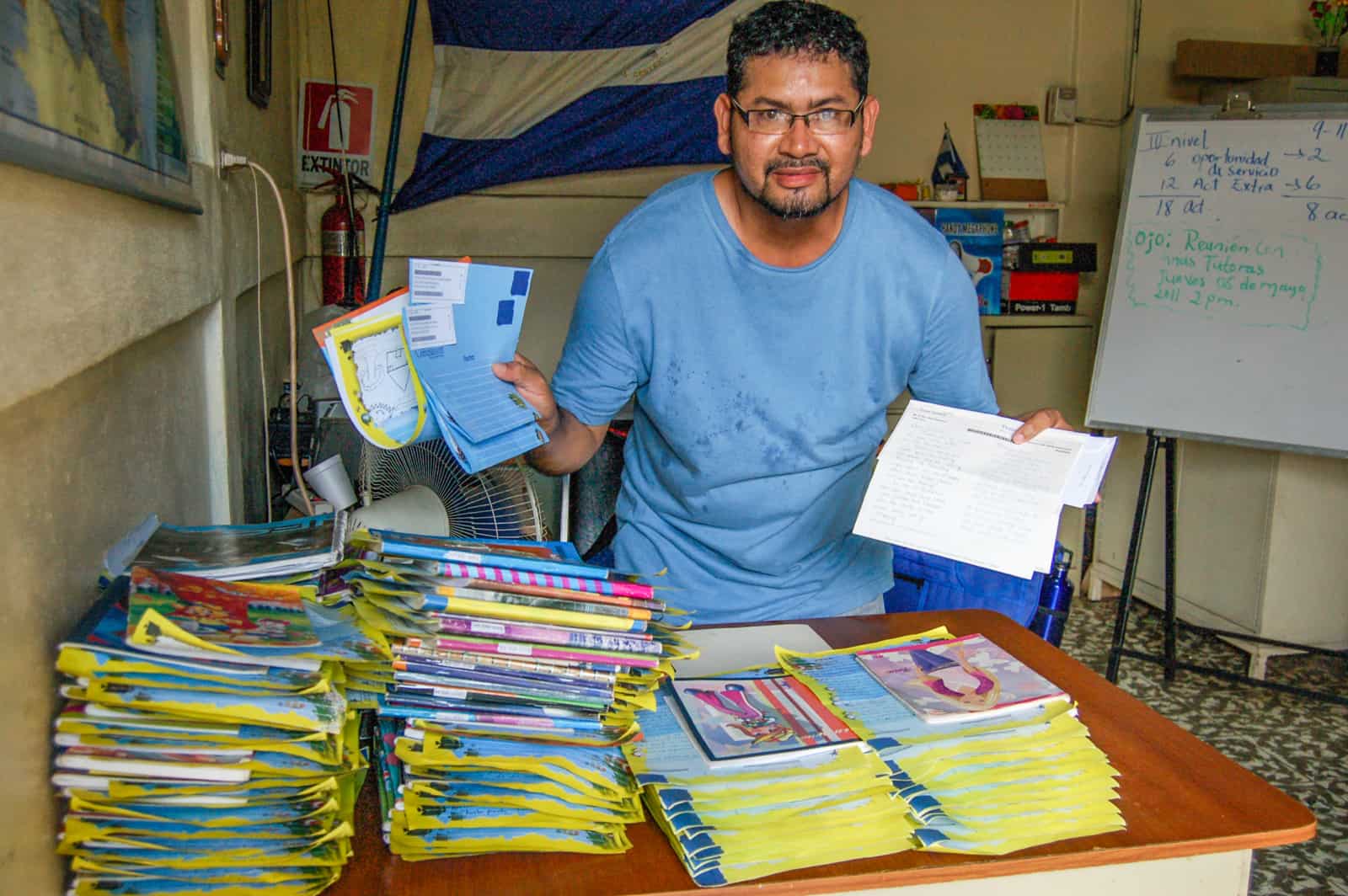Writing letters is something I’m not accustomed to doing. In fact, it is not usual in Nicaragua. At school, we study how to write letters but we never practice it.
So when some of my friends leave the country, it’s hard for them to send me letters and it takes me a while to write back when I do receive one.
If that is my experience, I can’t imagine how difficult it is for our development center staff, tutors and children to get in the habit of writing letters to the children’s sponsors three times a year. And to make sure they answer according to the last letter received.

A Compassion tutor helps a student write a letter to his sponsor.
Flor, a Compassion sponsor donor services supervisor, explains,
“Nicaraguans are not used to receiving letters and we don’t send any, either. Especially children who live in areas where they only go to elementary school, or their parents didn’t go to school.
They don’t know the importance of written communication, and in many cases, not even of verbal communication.”
As the number of registered children has increased, so has the concern over the content of child letters.
“As an office, we train child development center staff and have a follow-up card where translators take note of the sponsor’s questions in the letter. This card is attached to the letter so the development center staff can have control of the questions and answer them in the appropriate time.”
Translators and development center staff are periodically evaluated to check the quality of translation and letter content from children. These practices help improve the quality of the letters.

Débora is a secretary at one child development center and has already helped improve letter writing by passing on the training she received about reviewing the letters that had been received from sponsors. Débora shares,
“Our evaluations were low in sponsors’ questions being answered and in prayer requests, but I passed on the training to the teachers and our evaluations are now 19.9 out of 20.”

Juan, Secretary at a child development center in Nicaragua.
Juan, a secretary at another child development center, also shared,
“Once a month I remind tutors about the steps of writing letters. Tutors are also reminded to write the letter in the child’s notebook first, then in the letter format. This process is to help reduce mistakes in the letter.”
Another reason why children don’t always answer questions from your letters may be that the development center staff is new. This is not frequent, but it takes time for a new center worker to learn the process and to make a habit of writing with the children.
In cases like this, development center secretaries play an important role in training their new staff.
And sometimes, but not often, your question may not be culturally appropriate, such as a question about politics. Or your question may not be understood by a child or development center worker. Flor explains,
“Please understand that our culture is different from yours. Don’t get discouraged. Keep writing letters, sending your support, praying for your child and sending questions. You can ask your child to please answer your questions.
Let children know that their answers are very important for you and for your relationship with them.”
Thank you for your understanding and patience. We are all in the process of learning to write letters and to improve our communication.







39 Comments |Add a comment
How do you write to the sponsored child’s parent or caretaker?
Hi Mary! We truly appreciate your heart for our ministry and your desire to send your child’s parent an encouraging letter! Although you are not able to send letters directly to your child’s mother, you may absolutely write a special note in your next letter to Milton. After your message to Milton, you can also write a portion that is addressed to his mother. It is very normal for a child to take their letter home to show their family, especially when there is a note in the letter for the parent. Please rest assured that if his mother cannot read, then a tutor will gladly read it to her as well. Thank you for being in the Compassion family!
I’m feeling discouraged as I write to my child once or twice a month. I understand the translation process is slow but we are not getting responses about the photos or stories we share in the letters. Maybe this is just a small way for Satan to cast doubt in my mind for a truly wonderful ministry. I appreciate the blog post above to answer some questions I had. Please keep training and encouraging the children to answer appropriate questions. It’s the only way to build a relationship.
Lindsey, thank you so much for your kind words. I understand that the letter-writing process can be challenging and frustrating at times, but I’m so glad you found this post helpful. We are so thankful for your dedication to writing your child regularly. 🙂 May God bless you!
I’m grateful for the email letters as I have begun receiving typed translations next to my “daughter’s” replies. In the past it was written out in long-hand and was not able to be read without a lot of guessing. I could read my daughter’s righting even tho; I could not translate it much easier than the translator’s.
My daughter usually writes within a week or two of receiving a letter. This last letter has gone unanswered at this point tho’. I’m praying for the answer to one specific question and hope it comes soon.
Thank you so much for your kind words and positive feedback regarding the online letter-writing tool! We’re so happy to hear that it has made communicating with your sweet girl a bit easier! I sincerely hope you hear from your daughter again soon as well. God bless you!
Wow, cool that the little guy in the picture might be Rebecca’s little guy! 🙂 I use both the paper and the email, since the email has more stationery designs. 😉 I love both ways!
Reading through this again I wonder how many kids in the developed world know how to write letters these days? Emails maybe, text messages definitely, but good hardcopy letters – probably not. Letter writing could be a dying art, especially without Compassion.
Is there something we can do in our letters to make it easier for the staff? the letters do seem more like form letters. I received two letters from one child,in a week, and 90% were the same comments, only difference was the reference to her birthday gift. She asked for a picture, but multiple pictures have been sent. Really want to encourage her, but would like to know how it would help.
Is there any way to find out what project # that is in the photo above with the little boy and his teacher writing the letter? He slightly resembles my Omar with that crazy curly hair. That would be awesome!! 🙂
I am so sorry Rebecca for this REALLY late reply!! This is at NI 220 “Hijos Del Dios Viviente”
After studying that pic for nearly 2 months now, I am almost positive that is Omar. He looks so grown up!
On a recent sponsor tour to Ecuador, we met an LDP student who said that she learned to write letters at the project center. Something we take for granted…. and think that the children should just be able to write back with no problem. But yes, it is something that they must learn. And this blog helps us to understand that FIRST the staff must learn to write letters. Then the children.
Thanks!
Very insightful!
sorry, am tired! meant to write that I am thankful for all of the workers there…including Juan, also mentioned in the article!
God is so good….how much He is using Deborah, and the teachers in the Center. Thanks for sharing this.
I use the e-mail feature quite a bit, since I am at my computer most of the day, and find it much easier to type my thoughts, rather than write them in longhand. My handwriting leaves a LOT to be desired, so I take extra pains to make sure it is legible for the translator.
Having said that, I always make it a point to send one handwritten letter at least every other month, as well as one or two e-mails every month.
Understanding some of the cultural differences, however, does make it easier. I eagerly look forward to those Compassion envelopes in the mail. They make my day!!
I cherish and love getting letters from my sponsored child and I have never worried about whether or not she was writing it or whether or not my questions are being answered. I don’t sponsor her to get something out of it. I do it because I want her to know God’s love and to have a great future. Understanding the cultural differences does help to make sense of this. Thanks for this article.
@Deborah I would call Compassion, and have them investigate further your daughter’s child’s circumstances. Tell her not to get disillusioned. The year I was in Guatemala, and chose Alejandra to sponsor, we got to the zoo, and a Compassion staffer told me Alejandra was in the hospital with kidney problems, and wouldn’t be able to come. About 45 minutes before the kids left that day, Alejandra did come. She looked like she had been ill, but has since overcome the kidney problem. That was six years ago, and she graduates this year.
As far as email, I use it on occasion, but it just isn’t as personal as the written letter.
Hmmmm. Not sure I understand what you are saying here… The children and or translators don’t understand that a sponsor’s questions hope for an answer? I write to my child and I long to hear his answers to my questions. Not just rote exercises in penmanship. I want to KNOW my child. I want him to KNOW me. I would think that letter writing, and specific letter writing would be part of the curriculum and/or education experience that we as sponsors hope our funds are going toward. It can only benefit a person to understand how to respond to a letter. My concern is that some “translator” is answering my letter without my child ever really knowing what I have written to him, and without me ever knowing what has been written to me by him.
I totally agree that I want my child to know me as I want to know him. It sounded to me that they do include letter writing in training new project staff. Some projects are quite good at having children answer questions and some (from what I’ve seen posted on OC) definitely could use additional re-training. I agree that it can only benefit people to know how to read and write a good, informative letter.
From everything I’ve heard on here as well as from people who have visited with their kids, I highly doubt that your child doesn’t know what you wrote to him and doesn’t write to you back. If you notice major translation issues (ie, non-nonsensical [translators will take a child’s massive run-on sentence and make it understandable] or much too short for what was written) , CI encourages us to contact them so that they can work to fix the problem. Once I started numbering, highlighting my questions and saying I would like an answer, I started to get answers to my questions from my kid. However, sometimes I ask questions in each letter and that would mean 4 letters of questions to answer in each reply letter (my kid writes 3x/year), so in that case I think I need to be more careful in not overwhelming him! I really hope that CI’s overhaul of the correspondence system will help address some of the quality of letter writing issues as well as concerns that you (and other) sponsors have with the process!
Letter writing is good for them to learn. Better communication through relationship and it’s fun to do it.
I love to write letters as well. I tried the e-mail option, but find that actually writing out the letters gives me more of a connection to the kid. There is such a value in handwriting- I love it! I can’t wait to get a letter from my sponsored child with their handwriting on it. Plus with letters you can send out postcards and stickers. Can’t do that with email :).
I would be very disappointed if correspondence went entirely to email. Letters through email are not the same as a letter written by hand. Hand written letters are so much more personal, and in having a long distance relationship with these children, it is the closest we get to actually being there.
Yes, the drawings I receive from my sponsored child are wonderful, especially since my own children don’t make drawings for me any more.
Thanks for this article. It shows another piece of the important pie that is sponsor/child letters. What an important tool letter writing is in teaching communication skills to the kids.
Keep up the great work Nicaragua staff 🙂
Deborah, have your daughter report this to Compassion..did the uncle get your daughters personal address??? They’re not supposed to write your daughter like that. Please don’t let your daughter become disillusioned..there is a few bad apples out there but my kids are great and I’ve had no suspicious activity
Thanks for the article Orfa. I wonder if one of those letters in the pile is mine!! It’s hard to wait for letters from my 3 kids in NI-114 but now I have a better understanding of the extra hard work your staff must have to do just to turn out one letter. I have written an E-card or two but I love to see the handwritten letters of the kids and especially the pictures that they draw on the bottom. Keep up the good work, we sponsors really appreciate it.
I use Compassions online feature to write my sponsored child in Brazil. It’s so much faster for me. I love it. Last time I went in, it reminded me of his birthday too. I get there by logging into my account and clicking Write my Child.
Nothing could replace the awesome things he draws for my refrigerator though.
I gave my adult daughter the gift of sponsoring a child for her b-day.. she was delighted until recently she said she has received letters from the child’s Uncle saying she is in the hospital and needs more money?? My daughter is disillusioned….
Deborah, we need to get a copy of that letter so we can address that and find out what is really going on. You can find me today with the online chat feature. The number provided by Angela is good also. My extension is x4753.
Report this to someone at Compassion, only Compassion should be able to be the go between for communications and they would not be forwarding such a letter. Contact should not be made outside of Compassion for this very reason. I would think it very unlikely she is ill, or is aware this individual is trying to obtain money fraudulently.
Talk to Compassion about this-that doesn’t seem right to me.
Hi Deborah-
That sounds unusual for a monetary request via letter by family member. You will need to have your daughter contact Compassion (800) 336-7676 and send a field inquiry to the child’s home office to investigate further.
Deborah, get your daughter to phone your local Compassion office and ask about these letters. Someone at Compassion should follow this up and find out what’s going on as this is not normal.
This may well not be true, but just an attempt by some person to gain money. Contact your local Compassion office and I am sure they can check up on this fairly quickly.
Interesting article! I wonder how technology (i.e. computers and email) will impact countries that don’t have a strong letter-writing custom? Perhaps these countries will embrace emailing as much as we have in the U.S. and written communication will become the norm.
I was just reading an article entitled, “Is the Written Letter Dead?” I hope we sponsors and our sponsored kids are keeping that art form alive for the time being. 🙂
Just curious — has Compassion ever considered going over to an all email format for sponsor/child communication? Pros: It would cut costs significantly. Cons: It would cut out people (like my mom) who don’t have a computer. Just wondering…
I’ve heard it mentioned. Ideas get mentioned all the time. But it’s unlikely to happen. We don’t want to cut people out of the communication process, we want to get people writing more, and there is value in a handwritten note that gets lost in an email.
I hope that they wouldn’t ever switch to something like this. Several older people from my church sponsor and don’t get online, so their contact would be essentially cut from the child.